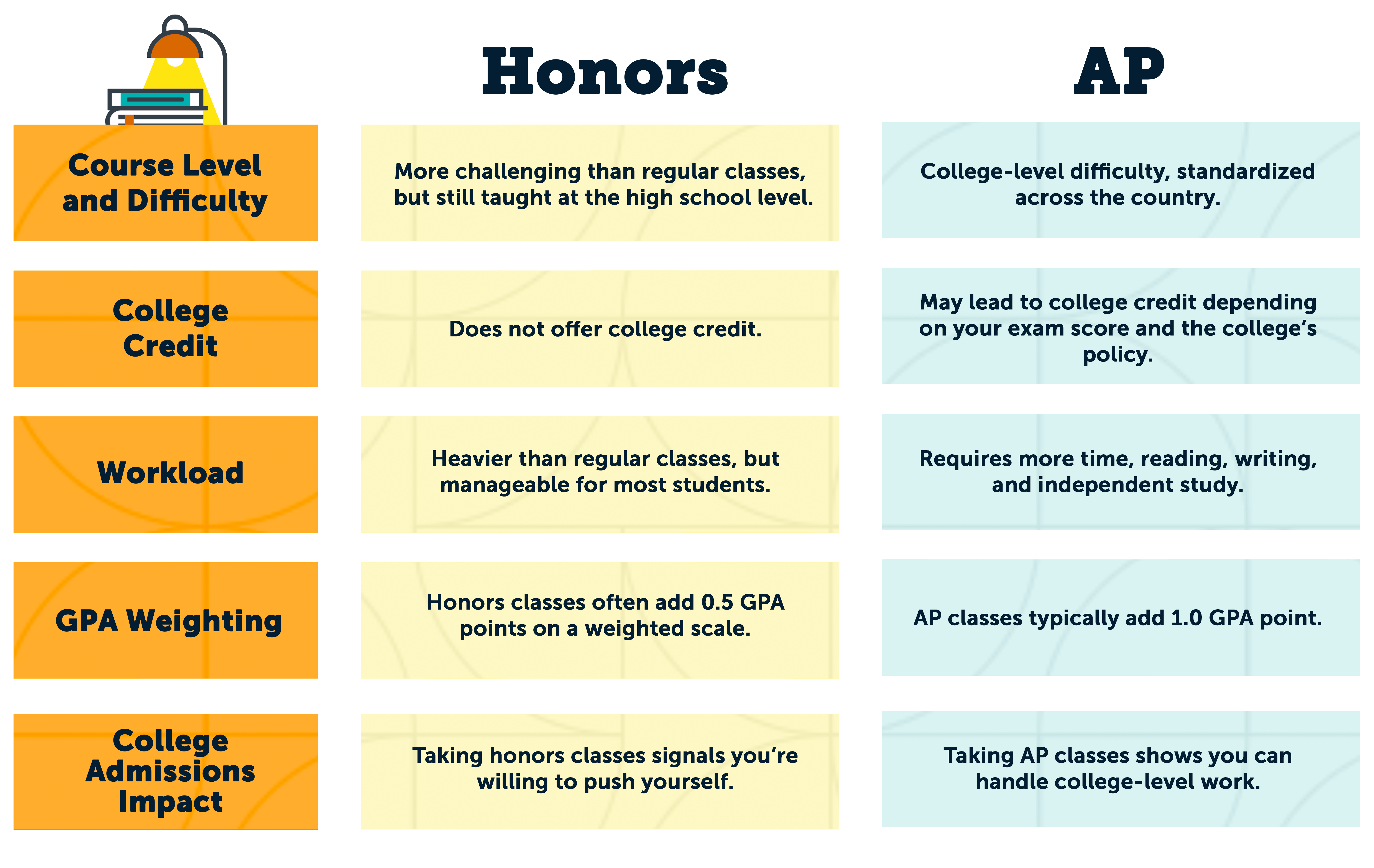AP vs. Honors: What’s the Difference, and Which Should You Take?

If you’re mapping out your high school classes, you’re likely facing the decision of whether to take Advanced Placement (AP) courses or honors classes. Both are more challenging than standard courses, both can strengthen your transcript, and both can help you get ready for college. But they aren’t the same, and understanding the difference can help you choose the path that fits your academic goals, your schedule, your strengths, and your learning style.
In this article, we’re breaking down what honors and AP classes are, how each one affects your GPA, and sharing some tips for deciding between them, especially regarding what stands out on a college application.
What are honors classes?
Honors classes are advanced versions of standard high school courses. They move faster, go deeper into the subject matter, and expect more independent work from students.
Students typically take honors classes in core subjects like English, math, science, and history. While programs vary from school to school, most honors classes:
- Cover more complex material
- Require stronger writing or analytical skills
- Expect students to participate more deeply in discussions
- Offer a small GPA boost on weighted scales
Colleges appreciate the effort students put into taking honors classes. Admissions officers know these courses require extra work and commitment. By choosing honors classes, you show you’re willing to challenge yourself and handle tougher assignments.
What is an AP class?
AP (Advanced Placement) classes are college-level courses offered by the College Board. Students take them to challenge themselves and possibly earn college credit. Nearly 23,000 high schools in the US offer AP classes, and about 35% of recent graduates have taken at least one.
These classes:
- Follow a standardized curriculum
- Move at a college-style pace
- Require consistent study outside of class
- Prepare students for the AP Exam in May
AP courses are available in many subjects, such as arts, English, history, social sciences, math, computer science, science, and world languages. Each AP class uses a standardized curriculum, so students at different schools get the same level of challenge.
One significant advantage of AP classes is the potential to earn college credit. According to the College Board, more than 85% of colleges and universities in the US grant college credit, advanced placement, or both for qualifying AP exam scores. You can take a subject-specific AP exam at the end of the school year.
The College Board does not use official “pass” or “fail” labels for AP exams. Instead, students receive scores from 1 to 5. Many colleges consider scores of 3, 4, or 5 when awarding credit or placement, though policies vary by institution.
In addition to granting you college credit, your score might also land you an advanced placement in a particular subject. This can lead to a reduced college course load and a lower overall tuition burden.
AP courses help you build important skills like writing, critical thinking, and time management. By working with college-level material, you’ll understand the subject better and gain skills that help in future studies. Most students are glad they took AP classes and feel it was worth it.
When are AP Exams in 2026?
In 2026, AP exams will be administered in high schools during two weeks in May:

Week 1: May 4th - 8th
Week 2: May 11th - 15th
The specific exam dates within these weeks vary depending on the subject. You can find the exact dates for each exam on the College Board website.
The standard registration fee for each AP exam as of 2026 is $99. However, various fees and reductions might apply to you, depending on your school, financial aid status, and other factors. One of which is the College Board AP Exam Fee Reduction program, which provides a $37 reduction per exam for students who meet the College Board's income eligibility guidelines or qualify as an "identified student" based on participation in certain federal assistance programs.
AP vs. Honors: what’s the difference?
Even though both options are more rigorous than regular classes, they have key differences students should understand.

Which looks better on a college application?
We talked with an expert to learn which looks better on a college application. High school counselor and Appily contributor Matt Hale told us:
"Good AP scores are always a much better indicator when it comes to how well a student will perform in college than almost anything else. So I’d heavily favor the AP score over an honors class.The one additional note I’d give a student is that they should not dive straight into four or more AP courses in their freshman year of high school (if their high school offers that many APs) unless they know they can succeed with that workload.
If you take two APs as a freshman and a few honors classes, and you get a five on both AP tests and get As across the board in honors, that will look much better to a college than if you took five AP classes and scored twos and threes on all those tests.
Ultimately, if a student is looking to get into a top or competitive school, the most important thing is to succeed with the workload they take on and to take a wide variety of classes in different disciplines. Colleges will look at which classes were available to students and if they took classes that challenged them in fields that they don't necessarily intend to study in college.
A well-rounded student is almost always more sought after than a student who does very well in one or two subjects but never challenges themselves to explore other subjects."
Choosing the right class option for your goals
When deciding between AP and honors classes, it's essential to consider your academic strengths, goals, and overall workload. Here are some factors to consider:
Academic Strengths
Think about your strengths and interests. If you’re really good at a subject and enjoy it, taking the AP course could be a great fit. AP classes let you dive deeper and may earn you college credit. If you like studying a variety of subjects or want more flexibility, honors classes might be better for you.
College Goals
Research the colleges and universities you're interested in attending. Some institutions highly value AP courses and may prefer applicants who have challenged themselves with these rigorous classes. If your goal is to attend a college that significantly values AP coursework, it may be beneficial to prioritize AP classes.
However, remember that colleges also value a well-rounded academic profile, so honors classes can still be valuable in demonstrating academic rigor.
Extracurricular Activities
Think about how much time you spend on activities outside of class. AP classes are rewarding but can be demanding. If you’re busy with sports, clubs, or volunteering, it’s important to balance your academics and activities. Honors classes might give you a bit more free time for other interests.
Workload
Evaluate your overall workload and ability to handle a challenging course load. Taking multiple AP classes simultaneously can be academically demanding and require strong time management skills. Assessing your ability to handle the workload and maintain a healthy balance between academics, extracurricular activities, and personal well-being is vital. Honors classes may offer a slightly less intense workload while providing academic rigor.
There’s no one right answer; the best choice depends on your goals, interests, and workload.
You might prefer Honors if you want:
- A challenge, but not a college-level pace
- To strengthen your GPA without the pressure of an AP exam
- To explore advanced coursework in subjects you enjoy
- A balanced schedule that still leaves room for extracurriculars
You might prefer AP if you want:
- The opportunity to earn college credit
- A deeper, more rigorous academic experience
- To show you can handle college-level work
- A bigger GPA boost (if your school weights AP higher)
Many students take both, mixing AP courses in their strongest areas with honors courses in others.
Knowing your chances for college admission
Choosing between AP and honors classes is an important decision that can impact your academic growth and college success. You also have dual enrollment classes, which might be an option for you.But above all else, it's crucial to remember that your application is a comprehensive package, not just what an admission committee sees on your high school transcript. To get ready for applications and see how you compare to other students, try Appily’s college admission calculator. Enter your test scores, majors you’re interested in, and your GPA to see your chances at the colleges on your list.Click the button below to get started. It's always free and easy.
AP vs. Honors FAQ
What’s the difference between honors and AP?
Honors is advanced high school coursework; AP is college-level coursework with an optional exam for credit.
Are honors and AP the same?
No. Honors is more advanced than regular classes, but AP is more advanced than honors.
Is AP harder than honors?
Generally, yes. AP classes involve more independent reading, writing, and test preparation.
Do colleges care about honors classes?
Yes, taking honors classes shows you're willing to challenge yourself. But AP classes may carry more weight if offered at your school.
Do honors classes give college credit?
No. Only AP classes offer the possibility of college credit.
Is it better to take a “B” in AP or an “A” in honors?
It depends on your goals, course load, and the school’s weighting system. Colleges prefer to see both strong grades and appropriate rigor.